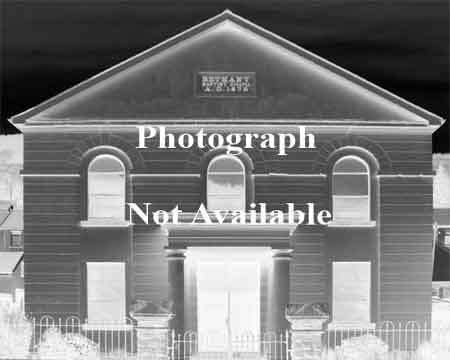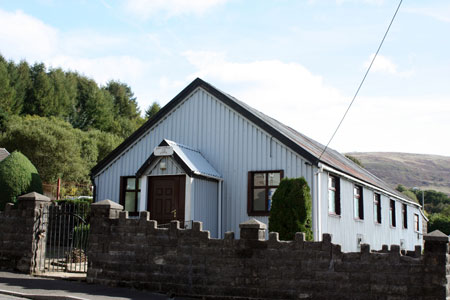Providence(1910)English Baptist, Woodland Terrace, YnyswenBuilt: 1912 [Sittings: 250]
 In the previous version of this site, I stated that this cause was a daughter-church to Horeb, Treorchy. This seems quite logical inasmuch that both were English-speaking. The reality is a little more complicated than that.

In fact it was Noddfa, Treorchy, Welsh Baptist, that sponsored its formation and construction. So whilst some members etc. might have come from Horeb, it is equally possible that some bi-lingual members of Noddfa, or even Ainon, but with a preference for English as the medium of worship, could also have been attracted to it. Equally, as you might read in the history of Bethel (English), Cwmparc there may still have been some bad-feeling from Horeb only some 6 years earlier.
There is also some conjecture that Providence was a formal 'branch' of Noddfa, although its history states it so, inasmuch that it does not appear in the English Baptist Handbook for some years after its formation although it did appear in the Welsh Baptist Diary albeit with no statistical or other information prior to 1915.
The initial meeting place was a local school-house in Ynyswen which still stands to this day and is affectionately known as 'The Coffin'. It appears that the Baptists 'moved in' when the Wesleyans 'moved out'. A local newspaper report states that Noddfa provided the seating for the newly-opened 1912 chapel although I am more inclined to assume they financed the whole constuction by means of a loan - there is just a brief mention of Providence in Noddfa's own published history - * "In 1910 the minister, and a number of brothers from the Sanctuary, became responsible for building a small chapel of Providence for the English in Ynys-wen at the top of Treorci. Mr. Harries, the "colporteur," looks after him...."- since up until the late 1950's weekly collections were deposited at Noddfa. And whilst Providence had long before been noted as an independent church it was, initially, attached to the East Glamorgan Welsh Baptist Association rather than, more typically, to the English equivalent.
Prior to 1970, Providence only had the services of three ministers one of which was Miss Bronwen Hale only the, as far as I am aware, second female minister in The Rhondda. She had been sent here under the auspices of her principal of the Bible Institute at Porth, R.B. Jones as it was feared that this cause was about to fail and required some ministerial guidance.
That situation changed upon the formation, under the auspices of the English Association, of The Upper Rhondda Baptist Group when Providence joined with Bethel (Cwmparc), Horeb (Treorchy) and Zion (Pentre) to share the services of not more than two ministers at any one time. The Baptist Group was later re-modelled as The Upper Rhondda Baptist Network which also included at least one Welsh-speaking church - Salem, Cwmparc.
These ministers tended to remain no more than 8 years before moving on. But special mention must be given to Rev. Neil Jayasuriya who arrived in 1976. It was with great sadness that this most popular of pastors decided in 1989 to exchange the fields of South Wales to the 'warmer' pastures of Australia.
He was a most enthusiastic and persuasive pastor and at one time Chaplain to Rhondda's Mayor. He commenced a youth club in the natural attempt to persuade young folk to attend chapel although the boys were more interested in the football team than anything else. I even became the secretary of the chapels' football league and officiated at games as far away as Aston, Birmingham. And although, as I have previously mentioned, not being a chapel-goer I was encouraged to pen an Easter play for Providence's Sunday-School. This was a modern take on the traditional story where television was interupted for a breaking-new report with interviews with the significant characters. I did attend the 'Premiere' but I know not of what the congregation thought of it.
Yet even when The Reverend Neil emmigrated to Australia he still kept in touch with his flock. It was a tradition to receive a phone-call on Christmas morning. The last time in recall personally speaking to him was at the 'celebration of life' of my departed mother in April, 2016. I think my late father did speak to him a few times after that but he was not in contact with anyone this last Christmas. I sincerely hope he is well.
As with most chapels having an ageing and dwindling congregation, a decision was made in 2013 to close it's doors for good. As a family friend said "We voted with our heads and not with our hearts."
The chapel is no longer there. A most fine residence has been built on the site. In fact I had found myself in a volunteer's car coming home from an extended stay in hospital driven by the lady of the soon-to-be-completed house. Given my family's, and to a lesser extent my own, involvement with this cause, I was most emotional during that journey. And that emotion persists as I pen this piece which I trust you can excuse for its length.
* Braslun O Hanes (History of) 1866 - 1966 by William Joseph Rhys 1966
|